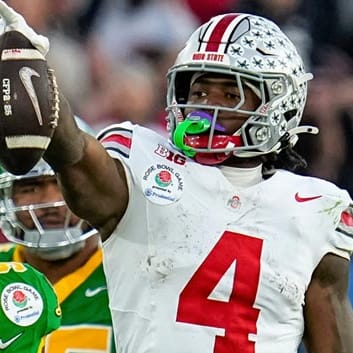As a young athlete, I was a complainer. I was a talker. Not a trash talker, mind you. I was way too small in high school to do any trash talking. Unless I wanted to be stuffed in a locker or forced to stand up on a chair and sing, "I'm a Little Teapot."
No, I directed my ire toward the refs. I refused to hold my tongue, against my better judgment. I'd throw up my arms in exasperation, give the officials my two cents, stomp around the court in frustration. Come to think of it, I'm surprised I wasn't thrown out of more games. I was a sore winner. I was an even worse loser. Maybe the refs knew my bark was bigger than my bite.
Yep, this column is going to be about officiating.
It's the last thing I want to do. I hate talking about the officials. Hate it. Believe me, I'd much rather be talking about high-octane offense, suffocating defense, one-handed catches and pick-sixes. Unfortunately, the zebras have significantly impacted several college football games the last couple weeks.
I would always think, who would want to be a referee? It's a thankless job. The players complain. All the time. The coaches complain. ALL THE TIME.
My father coached all of my sports teams growing up. One time, he got thrown out of a game because the referee told him that each team got 10 timeouts per half. "10 timeouts?!" my father decried. "That's the dumbest thing
As a young athlete, I was a complainer. I was a talker. Not a trash talker, mind you. I was way too small in high school to do any trash talking. Unless I wanted to be stuffed in a locker or forced to stand up on a chair and sing, "I'm a Little Teapot."
No, I directed my ire toward the refs. I refused to hold my tongue, against my better judgment. I'd throw up my arms in exasperation, give the officials my two cents, stomp around the court in frustration. Come to think of it, I'm surprised I wasn't thrown out of more games. I was a sore winner. I was an even worse loser. Maybe the refs knew my bark was bigger than my bite.
Yep, this column is going to be about officiating.
It's the last thing I want to do. I hate talking about the officials. Hate it. Believe me, I'd much rather be talking about high-octane offense, suffocating defense, one-handed catches and pick-sixes. Unfortunately, the zebras have significantly impacted several college football games the last couple weeks.
I would always think, who would want to be a referee? It's a thankless job. The players complain. All the time. The coaches complain. ALL THE TIME.
My father coached all of my sports teams growing up. One time, he got thrown out of a game because the referee told him that each team got 10 timeouts per half. "10 timeouts?!" my father decried. "That's the dumbest thing I've ever heard." I was 10. He used more colorful language than that.
Of course, referees are human. Just like players. Just like coaches. They miss calls. They get flustered. Human error and judgment calls are built into the game of football. Pass interference is a judgment call. Holding is largely a judgment call. A hold could be called on virtually every play.
On the whole, the referees do a fairly decent job. However, when the officials do their job correctly, nobody bats an eyelash. That is what's supposed to happen. Nobody congratulates the refs on a game where they make all the appropriate calls. It's their job. They are paid to enforce the rules effectively and correctly.
When the officials not only decide the outcome of the game, but miss calls that are not judgment calls, that's where the real problems lie. It's these simple misapplications or oversights that are truly troublesome. Let's look at two of the bigger mess-ups the last two weeks.
Miami-Duke: Laterally Speaking
The Miami-Duke game has gotten a ton of publicity the last two weeks. For those living under a rock, Miami lateraled the ball eight times on a kickoff return with no time left on the clock, as Corn Elder (best name is college football?) took the final lateral to the end zone for a stunning Miami win.
The officials initially called a block in the back, but picked up a flag. I have less of a problem with that. That's a judgment call. The real issue is the fact that none of the officials -- either on the field or in the replay booth -- saw that one of the runners had his knee down prior to one of the laterals. That would have ended the game, and Duke would have won. This is not a judgment call. Football 101 tells you that when a runner's knee is down, with the ball in his hand, he is deemed down. There's no grey area. He had not pitched the ball yet. He was down. This is what officials are for. This is what replay is for. The fact that none of the officials saw this is absurd. The entire crew was suspended for two weeks as a result.
Now, as a Miami alum, I must point out that this was not the only play the officials blew in this game. Of particular note, the refs awarded a touchdown to Duke's quarterback with six seconds left WHEN THE BALL CLEARLY DID NOT CROSS THE GOAL LINE. Again, this is not a judgment call. If the ball does not touch the white goal line on a carry, it is not a touchdown. Plain and simple. He did not cross the plane of the end zone. The refs fudged that one too. So both teams got screwed, Miami just got the benefit of the final screw up.
Michigan State-Nebraska: Out of Bounds, In The End Zone
This week, the zebras pretty much ended Michigan State's hopes of being a part of the College Football Playoff. Nebraska had the ball with less than a minute remaining. Quarterback Tommy Armstrong Jr. tossed the ball up into the air to Brandon Reilly. Reilly clearly went out of bounds on his own, then came back into the field of play to snatch the ball out of the air and win the game for the Huskers.
The problem? You can't purposely go out of bounds and then come back in and be the first person to touch the ball. That's a penalty. Initially, the referee took off his hat and tossed it onto the ground. That is the denotation that a player has gone out of bounds. Incredibly, the officials then huddled, and ruled that Reilly was pushed out of bounds, thus nullifying what's deemed "illegal touching" of the football. In real time, on replay, however you looked at it, it was clear that Reilly went out of bounds on his own. The initial call was even made. However, madness ensued, as the officials overturned the right call and made it the wrong call. Touchdown, Nebraska. Bye-bye undefeated record for the Michigan State Spartans.
But the officials then REVIEWED the play. They had to get it correct now, right? Wrong. Incredibly, this call was CONFIRMED by the head of Big Ten officiating later that evening. Maybe he didn't want to throw his own officials under the bus? Chaos reigns yet again.
The Fix Is In?
To the credit of both "losing" coaches, they handled the blown calls gracefully and respectfully. Duke coach David Cutcliffe simply stated that everyone saw the replay and that he wouldn't get into the call any further. Michigan State coach Mark Dantonio said it was not his job to officiate, and instead pointed to his Spartans blowing a double-digit lead with only a few minutes left in the game.
Can these types of situations be remedied? I'll be honest; I don't think there's a solution. An optimist would say that in the end, we want to get the call right. But is that always possible? Instant replay has served to save many refs, umpires and officials from having blown calls live in infamy, but even still, the human element allows for mistakes. However, the human element is a part of football, a part of sports, that will never be completely eliminated. For example, I doubt baseball will ever eliminate umpires calling balls and strikes, even if a computer system (QuesTec) grades them on the accuracy of their calls.
In the end, a combination of man and the machine remains the best solution. It would just help if the men who actually donned the striped uniforms had a clue. Or at least got some help from the replay booth. Nobody was going to convince the ref in my game that 10 timeouts in one half was absolutely insane. Not my father, not anyone. That ref believed that was the rule. And he was the authority. As seen with the examples above, even the system of checks and balances in place ultimately fails from time to time. Despite the outcry for changing results after the fact, it's not going to happen. This is just something that sports fans are going to have to live with. Replay should help officials get it right. That's what it's designed for, to minimize the obvious deficiencies and maximize the correct outcome. Perhaps the scope of replay should be changed in real time. However, as Sesame Street taught me when I was child; everyone makes mistakes, oh yes they do. There's simply no way to perfect the system. We all have flaws, referees included. I know that's no solace to Duke or Michigan State fans, but that's just the way the cookie crumbles.







































